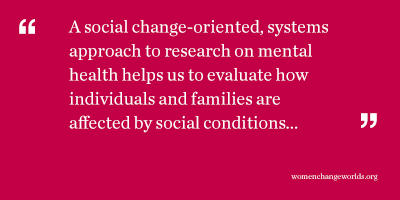 Part II: Social Scientific Perspectives on Making Change in America
Part II: Social Scientific Perspectives on Making Change in America
Yesterday, in my reflections on the 50th Anniversary of the March on Washington for Jobs and Freedom, I blogged about how the issue of pursuing change can be viewed through a social science lens--not just through a political or philosophical lens. The social scientific approach is to gather data and marshal evidence in ways that demonstrate why change would be beneficial or what kinds of actions help us get there. Today, I focus on some social science-related insights resulting from my own reflections on the March, indeed, on the whole civil rights movement and today’s human rights movements, with reference to the work we are doing here at the Wellesley Centers for Women.
Here are just a few of the social-science based social change insights that come out of our work here at the Centers:
In America, we agree that education is the gateway to success. Yet we also know that children must come to school ready to learn – physically, emotionally, and academically. We know that quality childcare helps children become ready for the classroom; that healthy eating and physical activity contribute to children’s mental and social readiness at all stages of development, and that early language learning is key. What we are also learning is that, when education includes social-emotional learning and social justice components, children and youth do better in school. Therefore, making sure that all children are ready to learn, that there are family, school, and community supports for this, and that our approaches to education are holistic are keys to social change in the direction of Dr. King’s dream and, indeed, so many of our dreams for an America characterized by equality and economic success, justice and jobs.
Whether we are getting it from news reports or simply by looking around in our schools, workplaces, and communities, we see a mental health crisis in America.  Depression is more epidemic than the common cold, and we hear more and more about such issues as bipolar disorder, post-traumatic stress disorder, and suicide. On the one hand, we have begun to recognize a connection between mental ibellness and certain forms of violence – and while mental illness certainly doesn’t explain all forms of violence in America, it raises our level of concern about why people experience mental illness and whether we are doing enough about it. Fortunately, the Affordable Care Act will make mental health treatment and care available to more Americans.
Depression is more epidemic than the common cold, and we hear more and more about such issues as bipolar disorder, post-traumatic stress disorder, and suicide. On the one hand, we have begun to recognize a connection between mental ibellness and certain forms of violence – and while mental illness certainly doesn’t explain all forms of violence in America, it raises our level of concern about why people experience mental illness and whether we are doing enough about it. Fortunately, the Affordable Care Act will make mental health treatment and care available to more Americans.
Researchers and clinicians alike are coming up with innovative treatments and prevention strategies. One example involves accessible, Internet-based interventions for families with a depressed member. Another example is using the “neurobiology of connection” to understand and address an array of troubling phenomena, from drug abuse to bullying, that may have mental health consequences or correlates.
A social change-oriented, systems approach to research on mental health helps us to evaluate how individuals and families are affected by social conditions – everything from economic strain to violence in their communities to discrimination based on race, gender, sexual orientation, nationality, religion, age, or ability. For example, we now know that trauma-informed strategies help us to promote school success in children from the most vulnerable families. And learning how hard it is for low-wage women to utilize family leave policies or access higher education helps us to improve both policies and strategies. It also helps us to understand how we can create optimal conditions for human development and social justice simultaneously. Research helps us understand that mental health itself is a social justice issue.
When girls feel like school isn’t designed with their needs in mind or STEM education pushes them to the side, they disengage. Yet, when girls are given equal opportunities in sports, they thrive – demonstrating that gender equality policies such as Title IX make a difference. Research can also help us make subtle but important distinctions in social policy. For example, bullying discourse often glosses over school-based forms of gender-based violence, leaving girls in the cold. Armed with the information provided by gender-sensitive research, policy-makers can and do make policy more effectively.
At the Wellesley Centers for Women, we not only conduct primary and secondary research, but we also maintain a close relationship between research and program development, recognizing that evaluation research is a critical component in the social change equation. Social change-oriented research institutes and centers, whether they focus on women and gender or something else, are an under-celebrated link in the chain of effective social change. In fact, research and researchers can be and are often social change catalysts. This is what I am celebrating today!
Layli Maparyan, Ph.D. is the Executive Director of the Wellesley Centers for Women at Wellesley College.
When you subscribe to the blog, we will send you an e-mail when there are new updates on the site so you wouldn't miss them.
Comments